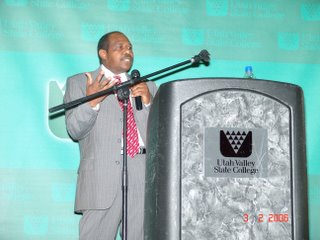Paul Rusesabagina - Real-life 'Hotel Rwanda' hero describes genocide's terrors
 Real-life 'Hotel Rwanda' hero describes genocide's terrors
Real-life 'Hotel Rwanda' hero describes genocide's terrorsMan who sheltered 1,200 speaking at Utah schools
By Erin StewartDeseret Morning News
OGDEN — Rachel Wagstaff could not restrain her emotion as she met the man who had given her hope so many times while she worked as a nurse in Africa last summer.
Erin Stewart, Deseret Morning News
Paul Rusesabagina, the Rwandan who sheltered refugees during the 1994 genocide, speaks at WSU Wednesday. Tears streamed down Wagstaff's face as she shook hands with Paul Rusesabagina, the Rwandan native who inspired the film of "Hotel Rwanda" by sheltering 1,200 Tutsi refugees during the 1994 genocide. "The first time I saw the movie I went by myself because I knew I would be a mess. I can really identify because I can picture people I knew there going through those tragedies," the 23-year-old Weber State University student said after listening to Rusesabagina's speech Wednesday. Rusesabagina, the real-life hero of the 2004 film, told WSU students how he fought for his life, losing all of his possessions and almost his family more than once during the Hutu rebel uprising that killed more than 800,000 people. As ethnic Hutus began killing their Tutsi neighbors, Rusesabagina, a Hutu married to a Tutsi woman, created a refugee camp at the hotel. "What you have seen on the screen about Rwanda is our day-to-day life. We can take it as a lesson to teach," said Rusesabagina, who will visit other Utah schools throughout the week including Utah State University today and the University of Utah and Utah Valley State College Friday. About 80 percent of Rusesabagina's audiences are students, he said, because he wants to raise awareness among youth about what happened in Rwanda and the needs that still exist today. WSU students packed a campus ballroom to hear Rusesabagina's message of peace and awareness, with many students clamoring for his autograph after the speech. "It's good for people to come and educate so the world can come together and help," said WSU student and Sudan native Titus Burapa. "The war is not going to end."
document.writeln(AAMB6);
Burapa said Rusesabagina's stories of slaughter in Rwanda reminded him of similar tragedies in his own country — tragedies he said most Utah students will not be able to comprehend. Rusesabagina explained some of the most horrifying moments in his life's tale, describing how he found himself running the Hotel Mille Collines where refugees had gathered to avoid being killed in the streets. Those people, he said, looked to him for food and security when there was none of either. Corns and beans were rationed out to the refugees, but security from U.N. and Belgium troops soon vanished as the conflict escalated, he said. "They decided to close eyes, to close ears, to turn backs and to run away," he said. "We see them giving up, abandoning us. That was the end of hope." Rusesabagina also told of the most difficult moment in his life when he decided to send his wife and four children to a planned refugee exchange while he stayed at the hotel. The refugees, he said, had told him they would jump from the roof of the building if he left rather than face mutilation by machetes. "You see your loved ones leaving. You do not know where they are going, whether they will be killed," he said. Rusesabagina's family returned shortly to the hotel after being attacked by rebels, his own wife beaten in the onslaught. Although Rusesabagina and his family survived the 1994 killings, he told WSU students that atrocities are still occurring in Africa and are ignored by the majority of world powers. "It is now or never to listen to these voices that are calling from the darkness," he said.
Paul Rusesabagina schedule
Utah State University — Today, 3-4 p.m. in the Evan N. Stevenson Ballroom
PRnewsfoto/Showtime, Bid Alsbirk
Don Cheadle, right, stars in "Hotel Rwanda," the film inspired by Paul Rusesabagina and his heroism in creating a refugee camp at the hotel. Utah Valley State College — Friday, noon in the Activities Center. A screening of "Hotel Rwanda" will be tonight at 8 p.m. in the Grande Ballroom. Admission is $1. University of Utah — Friday, 7 p.m. in the Olpin Union Ballroom. He will speak following a complimentary screening of "Hotel Rwanda."
Saturday, February 04, 2006
Rwandan refugee tells of need for awareness
KATIE ASHTON - Daily Herald
One man's courage left his body shielding that of his family and 1,263 other Tutsi refugees from machine guns, machetes and spears wielded by fellow Rwandans.
Paul Rusesabagina, the man portrayed in the critically acclaimed movie "Hotel Rwanda," walked into the activity center of Utah Valley State College to a standing ovation and overwhelming applause Friday afternoon.
"We never learn from the past to make a better future," Rusesabagina said, preaching the need for awareness about the African genocide that continues today. "Remember somewhere, in that African darkness, there are many voices calling you for help."
Rusesabagina recalled the terror his family went through to survive in 1994. His story acts as a living reminder of what many African countries continue to struggle with.
While world leaders met on Jan. 27, 2005, in remembrance of the Jewish Holocaust, repeating the words "never again," genocide continues, he said. Since 1996, when war erupted in the Congo, 4 million people have been killed, Rusesabagina said, and "the whole world is standing by and it does not say a word."
Rusesabagina's tale, which the movie closely portrayed, demonstrates the impact of one man's ability to stay strong and determined to save the lives of others.
What sparked the war goes back to when Rwanda was colonized by Germany and later taken over by Belgium. The Belgian government designated 14 percent of the population as Tutsi -- seen as the elite group -- and about 85 percent as Hutus, Rusesabagina said. In 1933, the situation worsened when the Belgian government instituted identity cards, blatantly designating Rwandans as either Hutu or Tutsi.
In 1990 and 1993 the Hutus rebelled and began slaughtering the Tutsi, he said.
Rusesabagina, the general manager of the Belgium-owned Mille Collines, and his family were able to leave Rwanda for a brief time in 1994 to Belgium, but returned to a situation that had only worsened. The United Nations ordered peacekeepers to offer support and a means for peace, he said.
But this effort was no more than a front.
"We believed in the peacekeepers," Rusesabagina said. "We did not know they would sit back and do nothing -- watch people killing people without doing anything."
For months, Rusesabagina had to rely on his diplomatic skills to keep his family alive. He soon turned the luxury Mille Collines hotel into a refugee camp for both Tutsis and Hutus. The U.N. soon pulled the peacekeepers out, he said, and "the whole world decided to abandon us."
"They simply closed ears, closed eyes and went away."
Rusesabagina quickly learned the means of survival was bribing rebels.
"I had learned the first lesson of how to deal with evil," he recalled.
After arriving at the hotel with 32 people -- family and neighbors -- Rusesabagina made every deal he could to keep alive what soon grew into a group of 1,268 refugees.
"I never gave up," he said about trying to contact everyone he knew within the country, and internationally.
There were days when he thought it was over, he said. Everyone knew their fate ended with death, he said, but it wasn't a matter of dying, it was questioning when, how and by whom.
"Dying is not our problem," Rusesabagina said the refugees told him. "But we cannot afford to be tortured."
Pleas such as this kept Rusesabagina with the group after word came his family could be transported to safety.
"I would never be a free man," he said, if he had left the refugees to die at the hands of the Hutu militia.
By the end of the genocide, it was estimated 800,000 people were killed, but 1,268 were spared because of Rusesabagina's actions.
Speaking to Friday's audience wasn't solely about the man behind the movie, but more about raising awareness, he said.
Worrying about what happens internationally and the opportunity to listen to someone with such courage and conviction is what brought Harper Wilson, a 20-year-old UVSC student, to the lecture.
"Government can't really be relied on to stop his sort of thing," he said, adding that is why he joined the U.S. Army in hopes of making a difference.
For others it was awe that brought them to listen to Rusesabagina.
"It really kind of changes my views on the world and international society," said 20-year-old Paul Ovuoba. "I couldn't believe that had actually happened."This story appeared in The Daily Herald on page D1.
Rwandan refugee tells of need for awarenessDaily Herald, UT - 15 hours agoOne man's courage left his body shielding that of his family and 1,263 other Tutsi refugees from machine guns, machetes and spears wielded by fellow Rwandans. ...
'Rusesabagina is Not Among Heroes'AllAfrica.com, Washington - 3 Feb 2006"Rwanda's heroes are not made in America, Europe or in Asia; cinema or film stars have no place on the list of National Heroes. ...
Genocide Survivors Are Heroes Too - KagameAllAfrica.com, Washington - 3 Feb 2006President Paul Kagame has classified the survivors of the 1994 Genocide as national heroes because of their spirit of perseverance and ability to cope with the ...
Pushing awarenessLogan Herald Journal, UT - 3 Feb 2006By Megan M. Roe. Never and again. Those are the two most abused words, Paul Rusesabagina told an audience packed into the ballroom ...
OUR VIEW: Students can help stop even genocide
Utah Statesman (subscription), UT - 3 Feb 2006On Thursday students gave Paul Rusesabagina a standing ovation simply for walking through the door. Students understood what he ...
Fighting back with words
Utah Statesman (subscription), UT - 3 Feb 2006Hundreds of students crowded into the Taggart Student Center Ballroom Thursday afternoon, some setting up their own chairs and some standing in the front or ...
Rwanda hero shares story
Salt Lake Tribune, United States - 2 Feb 2006The man who risked his life to save more than 1,000 people from being slaughtered in the mid-1990s - the man on whom the 2004 Oscar-nominated movie "Hotel ...
Real-life 'Hotel Rwanda' hero describes genocide's terrors
Salt Lake City Deseret News, UT - 1 Feb 2006OGDEN — Rachel Wagstaff could not restrain her emotion as she met the man who had given her hope so many times while she worked as a nurse in Africa last ...


0 Comments:
Post a Comment
<< Home